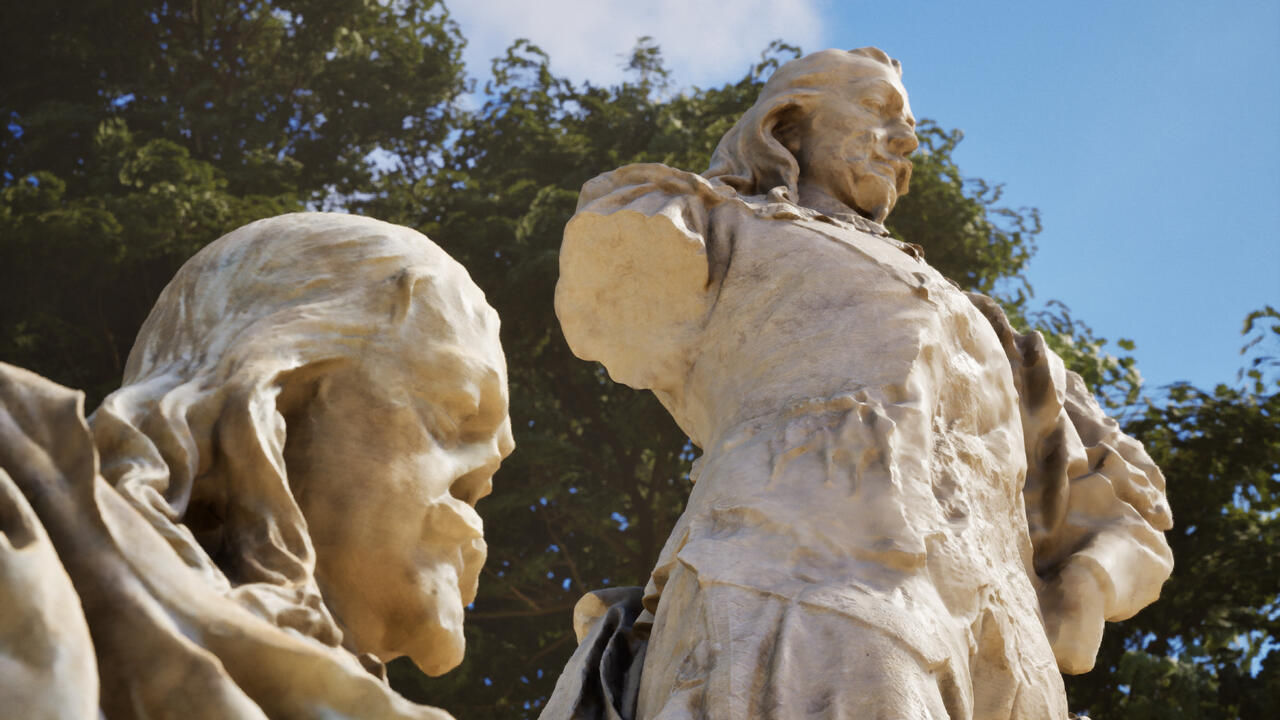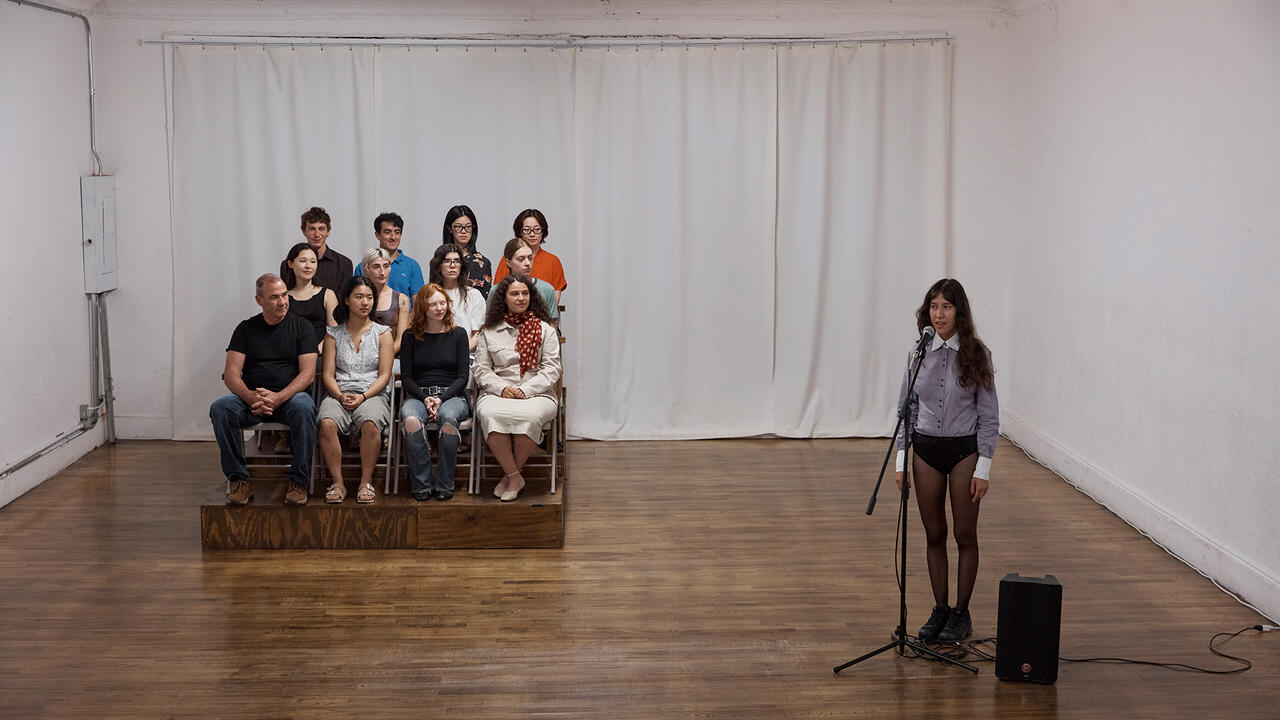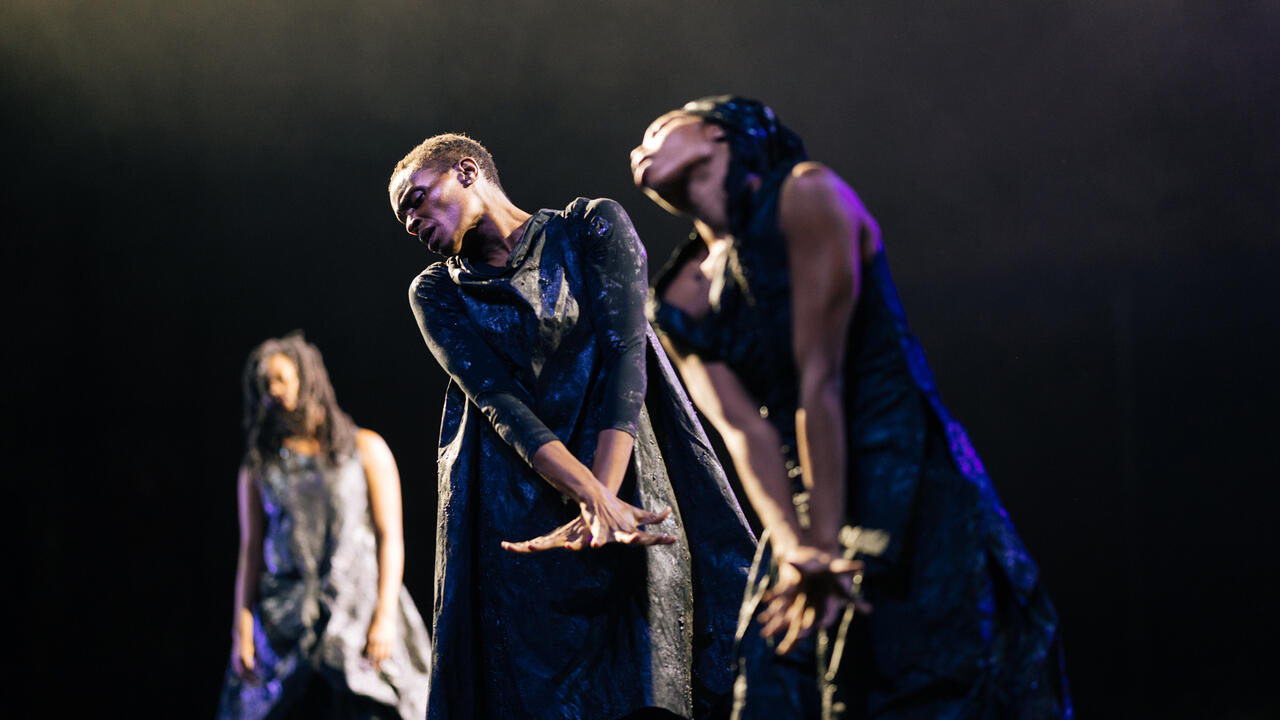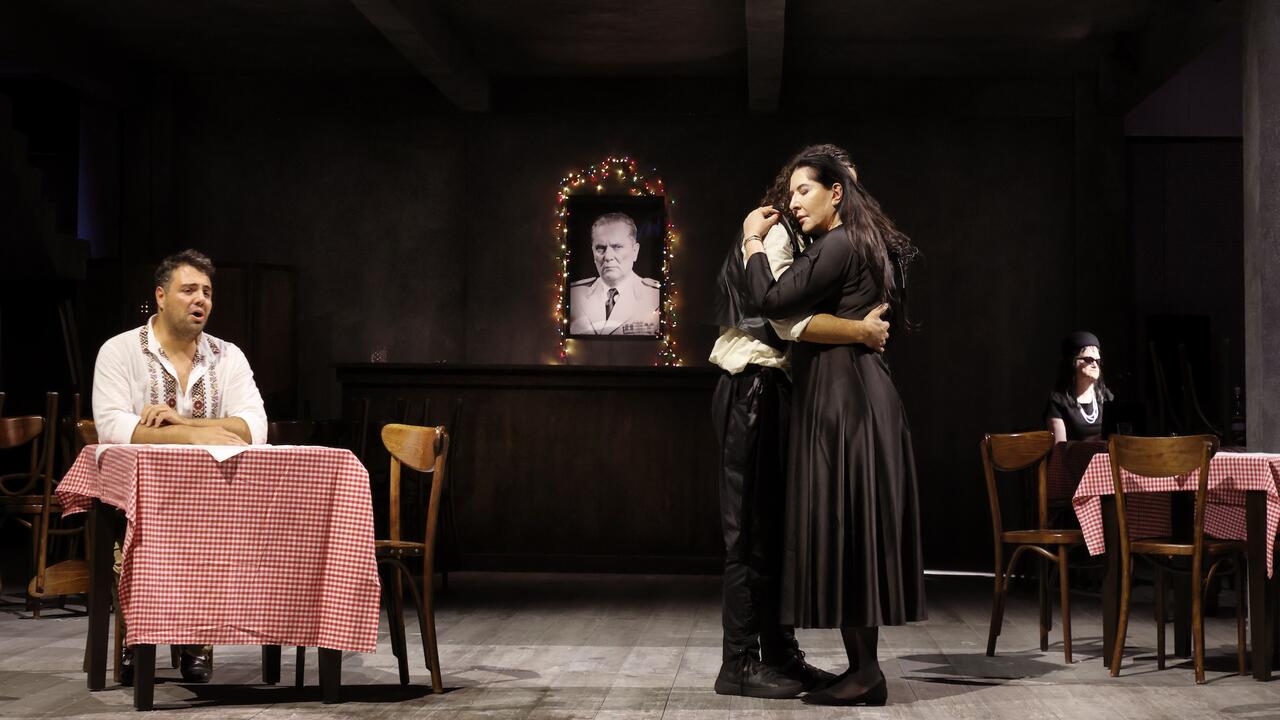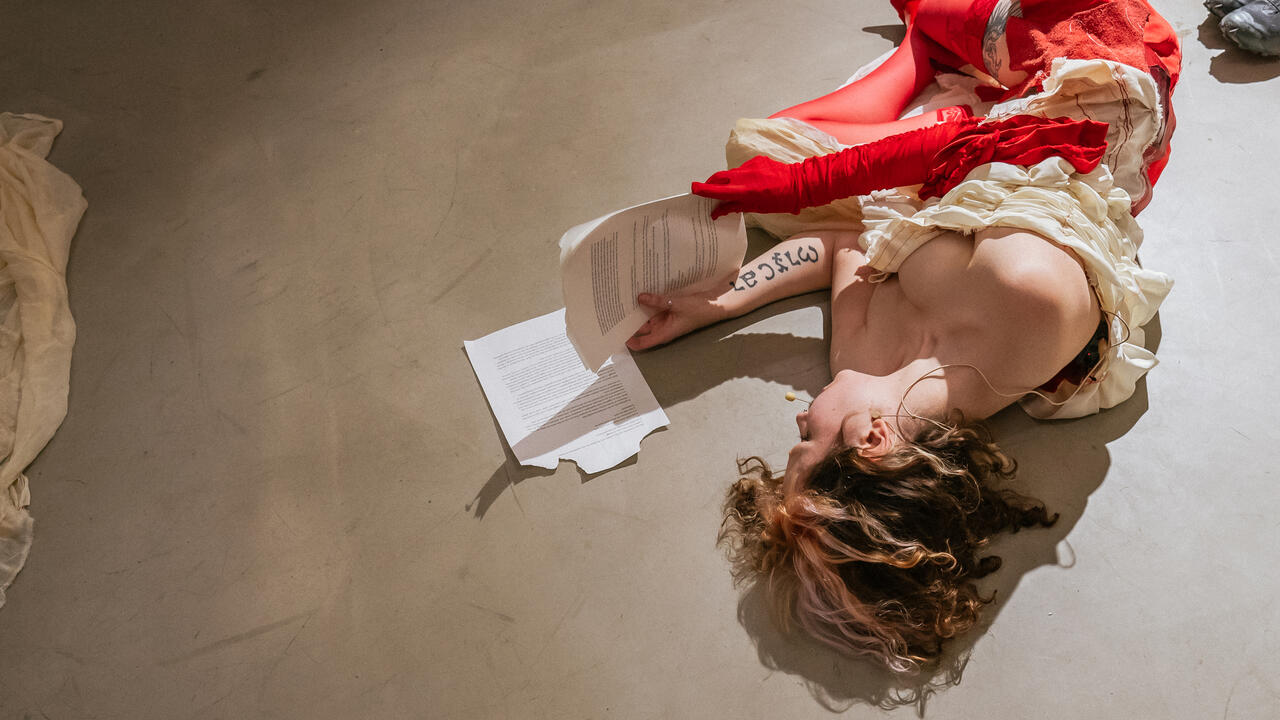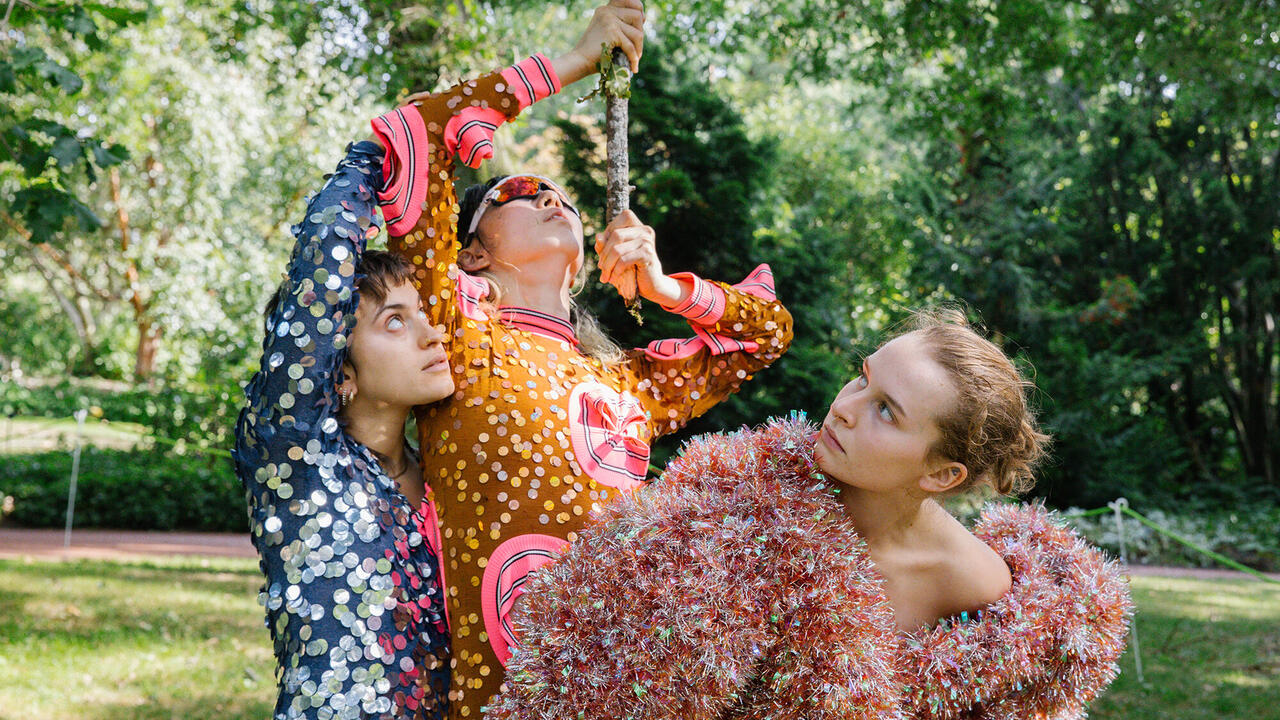Said & Done
Cally Spooner’s work explores how technology and new media are making performers of us all
Cally Spooner’s work explores how technology and new media are making performers of us all

She takes to the stage, head bowed, candid and coquettish. She knows something we don’t, as she kisses the microphone. Her mouth opens wide, but it does not tremble or hesitate: there is no saliva. Her skin is as smooth as a pebble; perhaps it’s L’Oréal’s True Match – the make-up she advertises on TV. Around this plastic pigment, her curls tumble and fall like digital flow: doll-like mechanics. Boy, she’s singing like she means it. You can watch it online as a ‘celebrity-news-video’: her ‘voice’ living on for posterity. Except she’s not singing like she means it at all; she’s lip-synching. ‘I am a perfectionist,’ she confessed once her cover was blown: ‘I practice until my feet bleed and I did not have time to rehearse with the orchestra.’ But there was not spit, or sweat – let alone blood.
'MONDAY! 21 JANUARY 2013! BEYONCE LIES TO THE PRESIDENT!'

It’s a year to the day since Beyoncé was busted for miming ‘The Star Spangled Spanner’ at Barack Obama’s second presidential inauguration and I’m in the rotunda at Tate Britain, when a tall female redhead howls this headline: it’s fabulously CNN. I’m here for the fourth iteration of Cally Spooner’s And You Were Wonderful, On Stage, a musical of sorts in which media scandals, pop-cultural gossip and its supporting PR language are translated into Broadway trilling and banshee wailing. Once it became known that Beyoncé had faked it for the president, poisonous messages such as ‘you fake everything, you even faked your baby bump’ were written in online comment feeds. Similar censorious comments are stitched into Spooner’s libretto.
And You Were Wonderful, On Stage also includes references to the recent speech by Michael Gove, the UK Education Secretary, about the importance of ‘knowledge’ in the British school curriculum; the departure of Obama’s head speechwriter, Jon Favreau, for scriptwriting in Hollywood; Lance Armstrong’s apology on the Oprah Winfrey Show for taking performance-enhancing drugs; and Justin Bieber’s ‘technical difficulties’ at the 02 Arena in London that left schoolgirls missing the last train home and resulted in his manager Scooter Braun’s urgent damage control on YouTube. ‘We know we’ve got some work to do / We need to dig a bit deeper’, writes Spooner, masquerading as Braun. The artist steals and layers their words into her libretto, along with the vomit messages of YouTube and toxic PR jargon. Hyperlinked headlines from these events function as the titles of each act. It is a musical of multiple, polyphonic elements.

Although the narratives are divided by their headlines – their stories self-contained – they speak to one another through their various failures. Armstrong chose the medium of glossy, confessional TV to stage his apology, while Braun channelled his rescue act via the internet. Spooner plagiarizes their speech, writing with a mask on – be it Beyoncé’s, Braun’s or Bieber’s – but, in her disguise, she exposes a cultural shift to mediated language. This is further embodied by the live interludes in the rotunda’s archways that restage a media company’s usage of employee ‘real-life’ stories, which were scripted as a means of selling the importance of ‘high performance’ in the workplace. As one employee repeats the lines given to her by the interviewer, her speech becomes increasingly regulated:
INTERVIEWER: Read it.
RESPONSE: From day one, our goal was to put together response technology that went beyond industry standards.
INTERVIEWER: One more.
RESPONSE: From day one, our goal was to put together response technology that went beyond industry standards.
INTERVIEWER: Again.
It is through these sung sketches that we can trace the influence of the philosopher Bernard Stiegler, who Spooner has name-checked as the literary subtext to the work. In texts such as For a New Critique of Political Economy (2010), Stiegler examines our relationship to technology and its impact on our use of language. He cites the example of spell checks to suggest how our linguistic agency is being passed over to machines, enforcing a loss of erratic, uncensored speech.1
In And You Were Wonderful, On Stage, Stiegler’s ‘automated language processing’ is translated into harmonic white noise, as the musical’s 26 female singers open the show with an overture of staccato high notes and mechanical warbles. It sounds like speech processed through a machine, its cogs destroying the syntax.
I’m on the ground floor of the rotunda, surrounded by a small clan of singing women. They look like cyborgs in their silver latex, and sound like them too, as they sing an engineered language of bits and bytes. The chorus-line makes verbal gestures from the balcony, like plinthless, oral sculptures, singing in the moment, improvising an edifice of female noise. The Edouardo Paolozzi sculpture that is parked behind the CNN redhead shakes with their cries.

I think of the poet Ariana Reines’s 2009 play Telephone, an adaptation of Avital Ronell’s The Telephone Book (1989), in which two inventors look to change the world with a wire. ‘Speech is silver, silence is golden,’ the computerized voice of the play’s promo trailer commands. The critical text, too, clings on, after the echo: ‘There is no off switch to the technological,’ Ronell writes in the preface, under the subheading ‘A User’s Manual’.2 It is a title that could just as easily be applied to Spooner’s year-long project that began at the Stedelijk Museum, Amsterdam, in April 2013, before being adapted according to cast and space: KW Institute in Berlin was next; then Performa 13, New York; and now here, at Tate Britain. Although Spooner wrote the libretto, the music was composed by Peter Joslyn and developed by a group of six singers who have performed the musical in each location – the chorus line changing with each city.
I drink tea with the London performers during rehearsals: we’re sat in a circle and everyone introduces themselves. Lisa has just moved to London from Wales: ‘I’m a struggling artist,’ she tells Spooner: ‘You’re successful; I’m struggling.’ Sue is a management consultant specializing in airline it. Rebecca gets the biggest cheer: she was in Eastenders. Spooner’s role is as organizational as Sue’s, as she workshops the libretto at each location, and at other events in between. The open rehearsal at Wysing Arts Centre, and the four-day artist’s talk at Arnolfini in Bristol, during which Spooner produced and distributed images from the musical, reveals the work being done backstage – the annotations, the conversations and the herbal tea – to be as much a part of the work as the live performance.
The satellite piece Spooner contributed to ‘La Voix Humaine’ (‘The Human Voice’, 2014) – an exhibition at the Kunstverein Munich that replayed themes from Francis Poulenc’s operatic adaptation of Jean Cocteau’s eponymous one-act play – is also part of the research. Damning Evidence Illicit Behaviour Seemingly Insurmountable Great Sadness Terminated In Any Manner (2014) is a performance (opera-style) in which Spooner uses the malcontent margins of online comment feeds to rewrite the recitative monologue. The soprano sings alone, as isolated as the trolls who wrote hate letters (underneath the YouTube documentation) to Beyoncé for lip-synching, to Obama for not writing his ‘Yes, we can’ speech, and to Armstrong for confessing to Winfrey. During the performance, the audience can translate the singer’s operatic intonations using an LED subtitle display, which functions as both a reading aid and an auto-cue for the singer. This text-apparatus was made according to the workshops the singers took part in with Spooner. As the words emerge onscreen, they synchronize with the live performance. In this work, the pop-politico figures have resurfaced, the content has been reframed and the operatic form (together with the same Munich soprano) will resurface in Spooner’s musical project. And You Were Wonderful, On Stage is as much a form of studio time as it is a musical: bits and pieces are taken out, remade in public, than fed back into the overall development.

Spooner is obviously interested in the act of return as a way of making art. Her 2012 project Collapsing in Parts, for example, included the publishing of an online novella; it gradually morphed into her current writing with a two-part show at MOT International in Brussels last June (entitled ‘Carol, I Think My Place In History Is Assured’). The first half, ‘The Book’, showed printed and packaged versions of the novella; while the second half, the ‘U-Turn’, featured a sound piece from the (work-in-progress) musical. Sung by the six lead singers, And as the Medieval Cloisters Connect Seamlessly to the Corridors of Power, I’m Quietly Confident is a recording of the lyric Spooner wrote in response to Gove’s speech. This became the second act of the libretto, but it is an expanded version of the live piece, extended to the six and a half minutes it took Gove to u-turn on his plan in parliament. Following pressure from the coalition, opposition and education groups, Gove was forced to abandon his baccalaureate agenda.
‘Ballad of Work’, the final song in And You Were Wonderful, On Stage, builds to a computerized climax, in which the chorus line morphs into operational automatons, their speech sounding like data. Their movements too, become increasingly algorithmic, with one performer copying the other’s gestures, before filing down the staircase and out of sight. Spooner harnesses repetitious rhetoric (‘We’re putting what we’ve learned to work / Learned to work …’) to demonstrate not only the robotic nature of corporate work, but also the robotic language through which this is imposed and achieved. Inasmuch as it suggests the slide from the live to the programmed, this final number signals the next stage of the project: a film trailer for a promised feature.

The performance at Tate Britain was the last rendition of And You Were Wonderful, On Stage as an ephemeral work. Made for the Performance Rooms at Tate Modern, the trailer, entitled He’s in a Great Place (culled from the Braun section of the musical), is located in a schizophrenic zone between the live and the technical. It is comprised of a mixture of pre-recorded material and a live operatic performance, transmitted via YouTube, in which the same comments as those used in Munich scroll horizontally across the screen. The members of the musical’s chorus line are no longer visible, but their voices resound in the audio. The latex has been remade too; painted black, it now dresses three dancing girls – their gestures as synthetic as plastic. Part of the pre-recorded material, their choreography has been adapted from the celebrities’ filmed failures, as when Bieber candidly touched his cheek to say sorry on YouTube. The pop-protagonists live on, not audibly, but as phantoms.
Insofar as the musical staged a systematization of language in everyday life, I wonder whether the death of its live status was always bound to happen. Is Spooner ‘doing a Beyoncé’ as she processes her work through the technical, and produces a mediated document of the ‘live’? As Ronell stated in her ‘User’s Manual’: ‘There’s no off switch to the technological’; it whirrs and vibrates constantly – there’s no escaping it. The technological endpoint of the project, the film, will happen: a screenplay, re-adapted. It will look something like the replica stage-set of the Winfrey/Armstrong interview that Spooner used for the ‘in-conversation’ which followed the airing of the trailer. The narration will come out of Spooner’s sound sculpture voiceover being made for Frieze Sounds New York 2014: the musical remodelled and remade, once more. And You Were Wonderful, On Stage is a title with a conjunctive for a beginning: a temptation and a connection; the ‘and’ is always going somewhere, groping for the next word. The musical itself is a bit like a conjunctive, as it repeats and morphs into infinite versions.
And, what next? I wonder.
1 Bernard Stiegler, For a New Critique of Political Economy, Polity Press, Cambridge, 2010, p. 33
2 Avital Ronell, The Telephone Book: Technology – Schizophrenia – Electric Speech, University of Nebraska Press, Lincoln, 1989, preface
Cally Spooner lives and works in London, UK. Her works is currently included in 'Pool: Art from London' at KestnerGesellschaft, Hanover, Germany (until 6 July). And You Were Wonderful, On Stage was performed at Tate Briatin, London, in January, as part of Performa 13, New York, USA, and at the Stedelijk Museum, Amsterdam, the Netherlands (both 2013). A second part of this project, He's in a Great Place, was broadcast live online as part of the BMW Tate Live Performance room in February. Forthcoming in 2014, are a solo exhibition at GB Agency, Paris, France, and a commission for Frieze New York Sounds.










